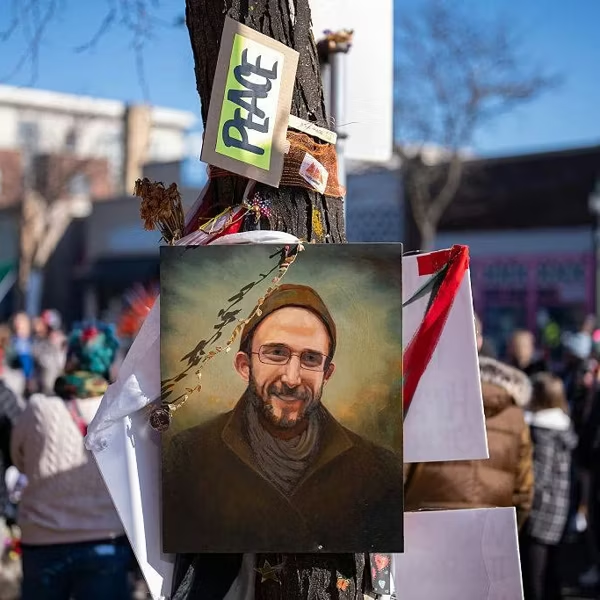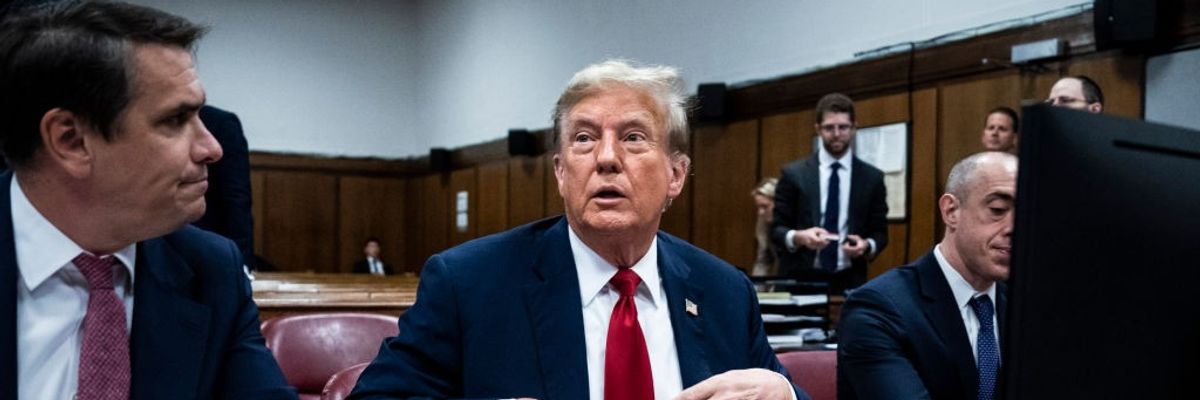Donald Trump became the first former or sitting U.S. president to stand trial on criminal charges when jury selection began Monday in his “hush-money” case in New York City. Not even Richard Nixon, who was saved from an indictment for his role in the Watergate scandal by a presidential pardon, achieved such ignominy. Whatever its outcome, the trial will make history.
Trump was indicted in New York on March 30, 2023 on 34 felony counts of falsifying business records to cover up a $130,000 payment to porn star Stormy Daniels to prevent her from going public during the 2016 presidential campaign about their alleged sexual encounter a decade earlier. In a “Statement of Facts” filed along with the indictment and in a press release issued the day of Trump’s April 4 arraignment, Manhattan District Attorney Alvin Bragg explained that the payment to Daniels was part of a larger “catch and kill” scheme Trump initiated in August 2015 “to identify, purchase, and bury negative information about him and boost his electoral prospects.”
In addition to the Daniels disbursement, the scheme involved a $150,000 payment to former Playboy magazine “Playmate of the Year” Karen McDougal to cover up an alleged extramarital affair, and a $30,000 payment to Dino Sajudin, a former doorman at the Trump Tower in Manhattan, who allegedly was trying to sell a story about a child Trump had fathered out of wedlock.
From a political standpoint, the hush-money prosecution may not be as significant as Trump’s other criminal cases, but apart from its embarrassing and salacious details—all of which will be laid bare in open court—it is no laughing matter.
The scheme was carried out by Trump’s former lawyer and “fixer” Michael Cohen, who made the payment to Daniels on Trump’s behalf and was later reimbursed by Trump. The payments to McDougal and Sajudin came from American Media, Inc., the former publisher of the National Enquirer tabloid, whose then-chairman and chief executive officer, David Pecker, is a long-time Trump associate.
Although evidence of the larger scheme will come before the jury to show Trump’s intent to use the payments to enhance his election prospects, the indictment only charges him with offenses related to Daniels.
There is nothing illegal per se about making hush-money payments. The wealthy often use them to secure nondisclosure agreements to keep embarrassing or confidential information private.
What makes Trump’s scheme unlawful, according to Bragg, is that Cohen’s $130,000 payment to Daniels was actually a contribution to Trump’s election campaign that was both undisclosed and exceeded the 2016 $2,700 limit on individual contributions set by the Federal Election Campaign Act. In addition, the reimbursement checks written to Cohen in 2017 were “illegally disguised [in the records of the Trump Organization] as… payment for legal services rendered pursuant to a non-existent retainer agreement” to hide their actual purpose. Eleven of the 34 counts lodged against Trump involve checks written to Cohen (nine signed by Trump himself); 12 concern false invoices Cohen submitted; and 12 involve false entries in records maintained by the Trump Organization.
Although New York prosecutors routinely litigate business-record frauds, such cases are usually handled as misdemeanors. Offenses become felonies when the intent to defraud includes an intent to commit or conceal another crime. The other crimes implicated in Trump’s scheme include federal election campaign finance violations, parallel state-election law crimes, and tax fraud.
As in all criminal cases, Bragg’s legal team will have the burden of proving their case beyond a reasonable doubt. The team has named 11 potential witnesses, headed by Cohen, Daniels, and Pecker. Also named are Trump administration operatives Hope Hicks and Madeleine Westerhout, and Trump Organization insiders Rhona Graff, Jeffrey McConney, and Deborah Tarasoff, who presumably will be called to help establish Trump’s knowledge of the scheme and his criminal intent.
In addition to the witnesses, the prosecution will present a trove of documentary evidence, including the reimbursement checks written to Cohen, the phony business ledger entries, and a taped telephone conversation between Cohen and Trump that Cohen secretly recorded in September 2016. The pair can be heard on the recording discussing how to hide the payments to McDougal.
None of this means that the case is a slam dunk. Cohen will be particularly easy prey on cross examination as a convicted felon. In 2018, he pleaded guilty in federal court to tax evasion, making false statements to banks and campaign finance violations for the Daniels and McDougal payments. He was subsequently sentenced to serve three years in prison.
Trump was never charged with a federal crime, but was named in the pleadings filed against Cohen as “individual 1,” on whose behalf Cohen allegedly acted.
All of this has Trump alarmed that his strategy of delaying his day of reckoning in a criminal trial is coming to an end. The strategy has worked thus far in the two cases brought by Justice Department Special Counsel Jack Smith for election subversion and mishandling classified documents, and in the case brought by Fulton County, Georgia District Attorney Fani Willis for election interference.
But the strategy has run aground in Trump’s former hometown, where he rose to fame as a real estate mogul and a “reality TV” huckster. Last week, his attorneys lost four last-ditch motions to delay the trial.
From a political standpoint, the hush-money prosecution may not be as significant as Trump’s other criminal cases, but apart from its embarrassing and salacious details—all of which will be laid bare in open court—it is no laughing matter. Each of the 34 counts carries a potential four-year prison term, with a maximum cap of 20 years for convictions on five or more counts.
We can’t peek inside Trump’s fevered mind, but it’s safe to assume, as former New Jersey Gov. Chris Christie has said, Trump “goes to bed every night, thinking about the sound of that jail cell door closing behind” him.




